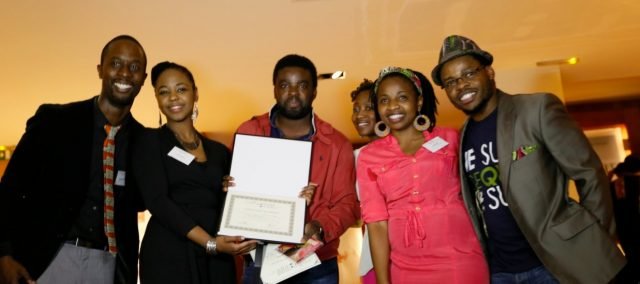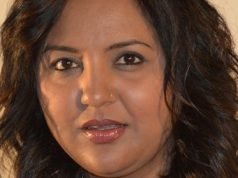Introduction – As a precursor to our forthcoming Art Issue, we ask two leading Nigerian artists, Emeka Okereke and Qudus Onikeku, to share reflections on their recent projects. In this essay, Qudus Onikeku, globally acclaimed Nigerian, Paris-based choreographer explains the thinking behind Nollywood Week Paris. He is the Artistic Director of YK Projects and co-founder and Artistic Director of Nollywood Week Paris

Those who were slightly familiar with my artistic preoccupation, have asked me: “what is it exactly that might have propped the mind of a dancer/choreographer, with such an outrageous touring calendar, to turn him into a die hard fan of Nollywood?”
It is indeed a curious case, but there is surely an explanation. I deal with body movements, with the texture and architecture of moving bodies on stage, and cinema, on the other hand, deals with motion pictures in frames. Also, the stage, just like cinema plays with the tones of light, shadows and color. And then, as a dancer, I’ve told stories with my works, just as cinema does; so, in that magical territory of visual spectacle and of story-telling, you can see that I am not a learner.
As a creative artist raised on Nollywood stories in Lagos, a professional life in Paris and across the globe has made the dream of a different utopia evident for me. With few friends we had previously organized a tour around six African cities, for a documentary film project I titled “Do We Need Coca Cola to Dance?” The title alone attests to my never ending quest for fresh air, for a different story and evidently, a different utopia. Then a strange idea came: NollywoodWeek in Paris.
Just the sound of it hints a wonderful thing. The Nollywood story is by any consideration a most phenomenal story, for an industry that began almost by accident, and has not benefited from any official or foreign support. A totally homegrown industry. Nollywood has created its proper commercial path, through a popular and old-fashioned manner of reaching out from doors to doors. It has therefore positioned itself as the legitimate business model, for the way Africa must position itself within global negotiations.
Nollywood now prides itself as the first homegrown African initiative with a global appeal. Everywhere you travel these days, you realize that Nollywood have been there before you. Therefore the question for me was, what should a NollywoodWeek Paris be like? Because a phenomenon like Nollywood is more than a Festival, the appropriate gesture must be that of gratitude, that is, a wonderful occasion to say thank you to all those who dreamt what was to become Nollywood today. This enormous success of the contemporary Nigerian cinema has made a complete redefinition of contemporary African art. Without any formal schooling, without recourse to foreign assistance, without the benefit of hefty budgets or of any of the dazzling gadgetry of Hollywood, Nollywood outstrips all its former predecessors, within the first two decade of its birth, and initiated a completely novel cinematic genre in global media.
It is certainly a story to marvel about, worthy of celebration and sharing with the world, that a group of half-literate dramatists of the popular traveling theatre tradition, seeing their trade tottering on the brink of extinction, because of the harsh economic policies of the 80s, could, out of desperation, seize the opportunity of newer technologies, and, in alliance with small-scale entrepreneurs, harness it with such inventiveness; and now their successors have tirelessly turned it into a multi-million Naira film industry, whose products have almost completely displaced the far more sophisticated, far more technically competent products of Hollywood and Bollywood.
From May 30 to June 2 2013, YK Projects presented the first edition of NollywoodWeek in Paris, at the Cinema l’Arlequin, in the heart of Paris, France. We gathered around 1500 spectators from around the world. In addition to having access to watch the most recent and talked about films from Nigeria on the big screen, seven movies were screened: MAAMi, PhoneSwap, IJE, INALE, Tango With Me, Last Flight to Abuja and Man On Ground. Our festival attendees also had the opportunity to meet the directors, producers, actors, scholars and French-based film industry professionals during conferences and Q&A sessions held throughout the festival.
For four days, Parisians celebrated Nigerian cinema and voted the film Phone Swap by Kunle Afolayan as the Public Choice Award winner for this first edition of NollywoodWeek. With the added Nigerian touches throughout the weekend, from Nigerian cuisine at the ‘Lagos Lounge’ to live musical performances, including a surprise session from Keziah Jones on the Opening Night, many walked away feeling this event was a success. As we celebrated however, we were equally aware that we are simultaneously responding to the increasing global curiosity for Nollywood movies. With this festival we have been able to speak to millions of Parisian cinephiles, who are so much in deep need, and deep thirst of a different utopia; watching stories, films, images, made by people who they share imaginations, questions, thirsts, needs, and dreams with.
We at Yk Projects are honored to present the best of New Nollywood to an entirely new audience, to make a resounding echo of all those who worked so hard to make the dreams become films; to be watched all over Nigeria, all over Africa and throughout the world. With this new platform, we also hope to create an annual hub, for all those scholars, journalists and researchers who have taken their time, to record and document a phenomenon that is constantly changing and constantly evolving. And to make it a legitimate meeting point between actors, directors, producers, co-producers, distributors and other industry professionals to exchange, to inspire one another and eventually, do things together.
—
Featured Image courtesy www.nollywoodweekparis.com [Kunle Afolayan posing with the Public Choice Award plaque]
The views expressed in this essay do not reflect the opinion of Saraba Magazine.
































